West and Central Africa
Contact the team
Featured content

Why you need a plan A, B and C: Using cash in hard-to-reach contexts
Blog Post
Cash and Voucher Assistance (CVA) can be a valuable response choice in hard-to-reach areas, but it must be properly adapted to context with sufficient investment given to preparedness. Mirko Tommasi explains how preparing multiple plans, being flexible and ready to change plans fast and frequently is crucial for success in challenging contexts.

CVA for people on the move: Time for a new vision?
Webinar recording
This event presented the main findings of our recently released study People are on the move: Can the world of CVA keep up? Analysis of the use of CVA in the context of human mobility in the Americas. Additionally, invited guests discussed key issues on facing the topic of human mobility and CVA and answered questions from the audience. The event included two videos’ interventions: one...

Changes to US and UN economic sanctions may simplify CVA implementation
Blog Post
Recent changes to the UN and US economic sanctions regimes promise to improve cash transfer process across international borders, but changes might not be as quick or comprehensive as we would hope. We put eight questions to Rory Crew, who has looked into the matter for you.
181 – 200 of 239 results
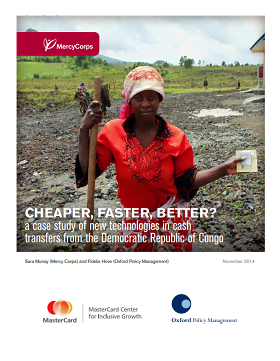
Cheaper, Faster, Better? A case study of new technologies in cash transfers from the Democratic Republic of Congo
Report
Over the past decade, there has been a growing consensus in the humanitarian community that cash, as compared to in-kind aid, is the best form of assistance to provide during an emergency. For families that have been displaced by a crisis or natural disaster, cash offers aid recipients more flexibility...

Mobile Cash Transfers for Urban Refugees in Niamey, Niger
Report
This study compared the effectiveness of cash transfers delivered through mobile phone and microfinance institutions to urban refugees in Niamey. The study found that the mobile phone delivery mechanism could be more cost-efficient than the MFI mechanism, after initial set up costs associated to...
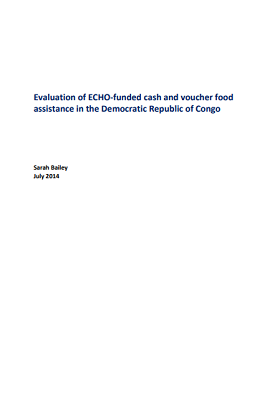
DRC Cash and Vouchers Food Security Evaluation (2014)
Report
People in eastern Democratic Republic of Congo (DRC) have long faced protracted conflict and instability resulting in the displacement of populations. In order to provide households affected by new displacements with timely access to food, ECHO funded the Norwegian Refugee Council (NRC), the Association...

Cash Transfers and HIV Prevention
Report
This paper proposes some initial principles on how to optimize HIV impacts of cash transfers, by encouraging targeting that: focuses on communities with high rates of new HIV infections, particularly acquired via sexual transmission; reduces local or community levels of economic inequalities between men...
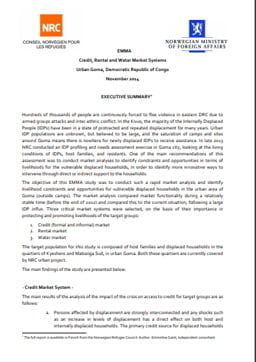
NRC – EMMA on Credit, Rental and Water Market Systems, Urban Goma, DRC, Nov 2014 – Executive Summary
Report
Hundreds of thousands of people are continuously forced to flee violence in eastern DRC due to armed groups attacks and inter-ethnic conflict. In the Kivus, the majority of the Internally Displaced People (IDPs) have been in a state of protracted and repeated displacement for many years. Urban IDP...
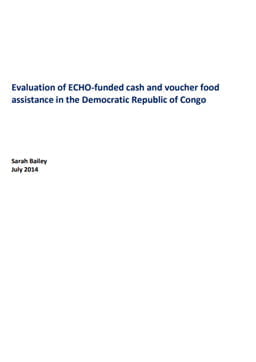
Evaluation of ECHO-Funded Cash and Voucher Food Assistance in the Democratic Republic of Congo
Report
People in eastern Democratic Republic of Congo (DRC) have long faced protracted conflict and instability resulting in the displacement of populations. In order to provide households affected by new displacements with timely access to food, ECHO funded the Norwegian Refugee Council (NRC), the Association...
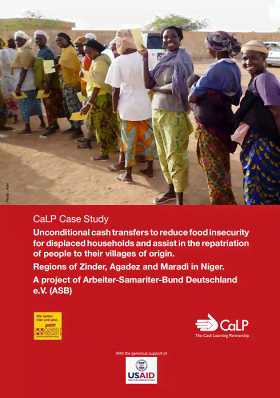
The CALP Network case study – Unconditional cash transfers to reduce food insecurity for displaced households and assist in the repatriation of people to their villages of origin – Niger
Report
In 2012, Niger was affected by a food crisis that caused large population displacements. The NGO Arbeiter- Samariter-Bund Deutschland e.V. (ASB) distributed unconditional cash transfers in areas of food insecurity to improve food access for those displaced and those affected, and to help repatriate...

Planning for government adoption of a social protection programme in an insecure environment: the Child Grant Development Programme in northern Nigeria
Report
Cash transfer programming (CTP) is increasingly used in West Africa in response to food and nutritional crisis. Beyond emergency situations, cash transfer mechanisms are key mechanisms for national social protection strategies and policies. Despite the rapid development of social...

Regional Learning Event: “Links between emergency cash transfer programming and social safety nets in the Sahel.” – Final report
Report
Cash transfers are nowadays widely used in response to the food and nutrition crises that affect the Sahel. Since the crisis of 2012, many stakeholders (including governments, United Nations agencies, international or local non-governmental organisations) have made use of them – at scale, in some cases....

Payment Mechanisms and Anti-Poverty Programs: Evidence from a Mobile Money Cash Transfer Experiment in Niger
Report
Cash transfers have become an increasingly important component of social protection policies in both developed and developing countries. While such programs are often implemented electronically in developed countries, in many developing countries with weak financial infrastructure, such transfers are...
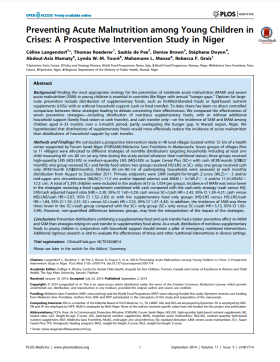
Preventing Acute Malnutrition Among Young Children in Crises: A prospective intervention study in Niger
Report
Governments and donor agencies need to know which preventative strategy is most effective, particularly among children under 2 years old who are most vulnerable to acute malnutrition. Here, the researchers compare the effectiveness of seven preventative strategies—including the distribution of...

Cash Transfers and Resilience: Strengthening Linkages Between Emergency Cash Transfers and National Social Transfer Programmes in the Sahel – Discussion Paper
Report
This discussion paper has been inspired by the exchanges that took place during the course of the learning event. It seeks to extend the discussion to include other actors working within the region, as well as in other regions confronted with the same questions. It proposes an initial approach to the...
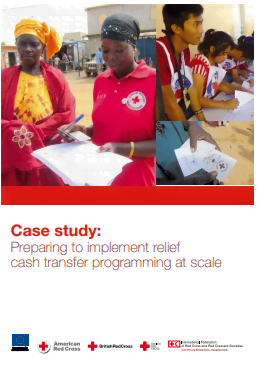
Case Study: Preparing to Implement Relief Cash Transfer Programming at Scale
Case Study
The International Federation of Red Cross and Red Crescent Societies (IFRC) worked with four pilot countries namely the Philippine Red Cross, the Vietnam Red Cross Society, the Senegalese Red Cross Society and the Chilean Red Cross, between May 2012 and December 2013 to support them with training and...

The Impact of Cash and Food Transfers: Evidence from a randomized intervention in Niger
Report
There is little rigorous evidence on the comparative impacts of cash and food transfers on food security and food-related outcomes. This paper assesses the relative impacts of receiving cash versus food transfers using a randomized design. Drawing on data collected in eastern Niger, the paper finds that...

CTP factsheet – Senegalese Red Cross – cash transfer preparedness pilots
Report
The IFRC worked with four pilot countries between May 2012 and December 2013 to enable the National Societies to use cash transfer programming to address relief needs at scale, implementing it more rapidly and targeting a larger number of households. The Senegalese Red Cross was one of the four...

Information and communications technology response to the Liberia ebola crisis
Report
An information and communication technology assessment recently conducted in Liberia by NetHope and USAID addresses the potential for digital payments in the response to Ebola. The documents looks into the digital payments landscape, describing the banking sector, use of mobile money and remittance firms....
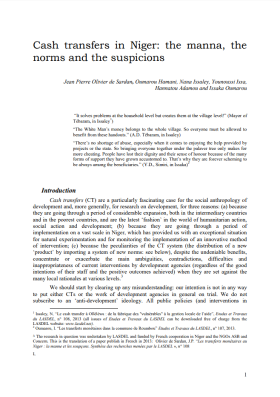
Cash transfers in Niger: The manna, the norms and the suspicions
Report
Cash transfers (CT) are a particularly fascinating case for the social anthropology of development and, more generally, for research on development, for three reasons: (a) because they are going through a period of considerable expansion, both in the intermediary countries and in the poorest countries,...
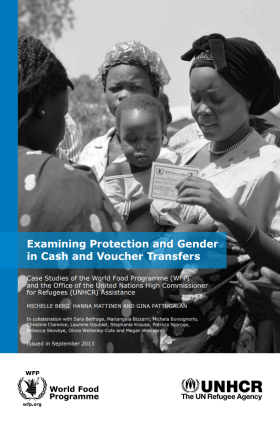
Examining Protection and Gender in Cash and Voucher Transfers
Case Study
With cash and voucher transfers increasing as a form of humanitarian assistance, the World Food Programme (WFP) and the UN Refugee Agency (UNHCR) teamed up to study the potential protection and gender impact of such transfers. While much research had been done about economic and market impacts of cash and...
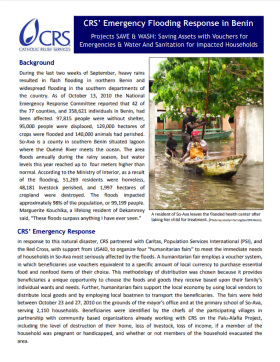
CRS’ Emergency Flooding Response in Benin
Report
In response to flash flooding in northern Benin and widespread flooding in the southern departments of the country, Catholic Relief Services (CRS) organised 4 “humanitarian fairs” to meet the immediate needs of households most seriously affected. These fairs were unique in that they incorporated three...

Cash Preparedness in Senegal: Cash Transfer Mechanisms
Report
Recognizing the growing importance of cash-based responses in humanitarian interventions and building on its own experience of implementing cash transfer programs through local partner organizations in Senegal in 2010 and 2012, Oxfam America sought to hire a consultant to determine the most feasible...


